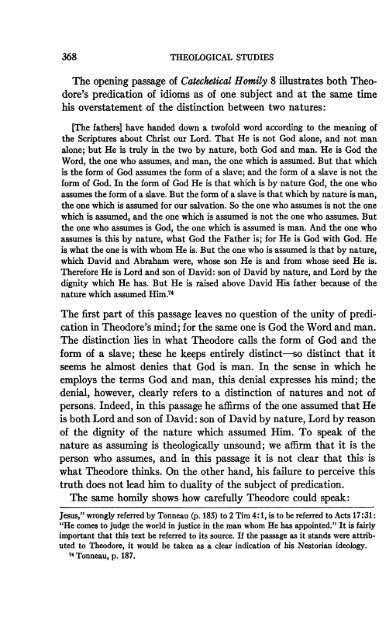ANNOTATIONS ON THE CHRISTOLOGY OF THEODORE OF ...
ANNOTATIONS ON THE CHRISTOLOGY OF THEODORE OF ...
ANNOTATIONS ON THE CHRISTOLOGY OF THEODORE OF ...
Create successful ePaper yourself
Turn your PDF publications into a flip-book with our unique Google optimized e-Paper software.
368 <strong>THE</strong>OLOGICAL STUDIES<br />
The opening passage of Catechetical Homily 8 illustrates both Theodore's<br />
predication of idioms as of one subject and at the same time<br />
his overstatement of the distinction between two natures:<br />
[The fathers] have handed down a twofold word according to the meaning of<br />
the Scriptures about Christ our Lord. That He is not God alone, and not man<br />
alone; but He is truly in the two by nature, both God and man. He is God the<br />
Word, the one who assumes, and man, the one which is assumed. But that which<br />
is the form of God assumes the form of a slave; and the form of a slave is not the<br />
form of God. In the form of God He is that which is by nature God, the one who<br />
assumes the form of a slave. But the form of a slave is that which by nature is man,<br />
the one which is assumed for our salvation. So the one who assumes is not the one<br />
which is assumed, and the one which is assumed is not the one who assumes. But<br />
the one who assumes is God, the one which is assumed is man. And the one who<br />
assumes is this by nature, what God the Father is; for He is God with God. He<br />
is what the one is with whom He is. But the one who is assumed is that by nature,<br />
which David and Abraham were, whose son He is and from whose seed He is.<br />
Therefore He is Lord and son of David: son of David by nature, and Lord by the<br />
dignity which He has. But He is raised above David His father because of the<br />
nature which assumed Him. 74<br />
The first part of this passage leaves no question of the unity of predication<br />
in Theodore's mind; for the same one is God the Word and man.<br />
The distinction lies in what Theodore calls the form of God and the<br />
form of a slave; these he keeps entirely distinct—so distinct that it<br />
seems he almost denies that God is man. In the sense in which he<br />
employs the terms God and man, this denial expresses his mind; the<br />
denial, however, clearly refers to a distinction of natures and not of<br />
persons. Indeed, in this passage he affirms of the one assumed that He<br />
is both Lord and son of David: son of David by nature, Lord by reason<br />
of the dignity of the nature which assumed Him. To speak of the<br />
nature as assuming is theologically unsound; we affirm that it is the<br />
person who assumes, and in this passage it is not clear that this is<br />
what Theodore thinks. On the other hand, his failure to perceive this<br />
truth does not lead him to duality of the subject of predication.<br />
The same homily shows how carefully Theodore could speak:<br />
Jesus," wrongly referred by Tonneau (p. 185) to 2 Tim 4:1, is to be referred to Acts 17:31:<br />
"He comes to judge the world in justice in the man whom He has appointed." It is fairly<br />
important that this text be referred to its source. If the passage as it stands were attributed<br />
to Theodore, it would be taken as a clear indication of his Nestorian ideology.<br />
74 Tonneau, p. 187.
















